#but i am a qualified gemmologist
Explore tagged Tumblr posts
Text
Yay for spodumene! Spodumene varieties are lesser known in the gem trade than many of the more famous gem species (I admit I'd never seen it before studying my diploma) and kunzite and hiddenite are probably the most desirable.
(@theproblemwithstardust I know you probably know more about this than me but here's the breakdown for anyone who is interested...) Oh but also below a keep-reading because I also rambled ^^;

pure spodumene without any impurities is clear Many gemstones would be colourless if they were completely chemically pure. Their colour comes from trace amounts of other chemical elements which are not intrinsic to the chemical crystal structure of the mineral itself - these are called allochromatic or 'other-coloured' gems!
For example, pure corundum (aluminium oxide) is colourless (we'd call it white sapphire! If it contains traces of iron and titanium this colours it blue, and we call it sapphire. If it has impurities of chromium it is coloured red, and we call it ruby!
Gemstones where the colour is caused by an element intrinsic to the crystal structure are called idiochromatic or 'self-coloured'. Examples include peridot (magnesium iron silicate) and pyrope-almandine garnet (iron aluminium silicate)

pink/purple gem varieties [of spodumene] are called kunzite and the color is caused by trace amounts of Mn Manganese as a colouring element in gemstones often produces a pink to orange colour palette depending on the surrounding crystal environment. It causes the pink of spodumene var. kunzite and beryl var. morganite as an impurity (allochromatic gems), and the orange of spessartine garnet and pink of rhodonite and rhodochrosite as an intrinsic chemical element (idiochromatic gems)
the color is very prone to fading in uv light A great tip for any pink or light purple stones is to keep them away from strong light! Their colour can fade from prolonged exposure to ultraviolet radiation, and you wouldn't want to spoil your beautiful gem collection - so tidy your jewellery away nicely and maybe stop keeping your rose quartz crystals on the windowsill in full sun :')
Fun fact I did my own experiment with zircon based on a paper I'd read about reversing the colour degredation caused by UV exposure. I was so excited I forgot to take before and after photos! The great news is (in zircon at least) you can reverse the colour change by exposing the stone to incandescent light (which is typically accompanied by infra-red radiation - ie/ the kind of light bulb that emits heat!) But I'm getting distracted from spodumene...

The dark green variety is hiddenite, NOT kunzite like it is labeled here and the color is due to trace amounts of Cr and possibly V My memory hack for learning this gem variety was that hiddensite is like Hiddleston like Tom Hiddleston who wore green as Loki in the Marvel films :P So yes the chromium-coloured green variety of spodumene is called hiddenite!
Many lesser known gem colour varieties get referred to as 'colour famous-cousin' for ease of explanation - it's not gemmologically correct but it often happens particularly when it comes to trying to sell these things! Lots of people wouldn't know prasiolite, but they can imagine what you mean when you say 'green amethyst'.
That said, there are times it is correct to do this! Sapphire occurs in every colour except red (because if it's red, we call it ruby), but any other colour is referred to as 'colour sapphire'. So it is correct to say pink sapphire, yellow sapphire, purple sapphire! If you just say 'sapphire' we assume you mean blue :)
the pale green/yellow gem variety of spodumene [is] called triphane Oh exciting! I didn't know this! ^_^

Not spod related but we also learned in mineralogy that bixbite is an outdated term since it’s so close to bixbyite. we just call it ‘red beryl’ but I’m not sure what it is like in the gem world!) The proper way to refer to it would be beryl var. red beryl, but if you said bixbite we'd still know what you meant! :) This is also a gem which would be misnomered as 'red emerald'...
Naturally occuring red beryl is very rare, and typically occurs in small sizes not suitable for faceting as gemstones. That said, these things can be created synthetically and synthetic hydrothemal red beryl is another stone which shows FAB orange/pink pleochroism!
ps. I think a lot of the pictures in the original post are colour enhanced, it's a fun guide but maybe go speak to your friendly neighbourhood gemmologist if you want to know if they're actually representing the colour correctly!
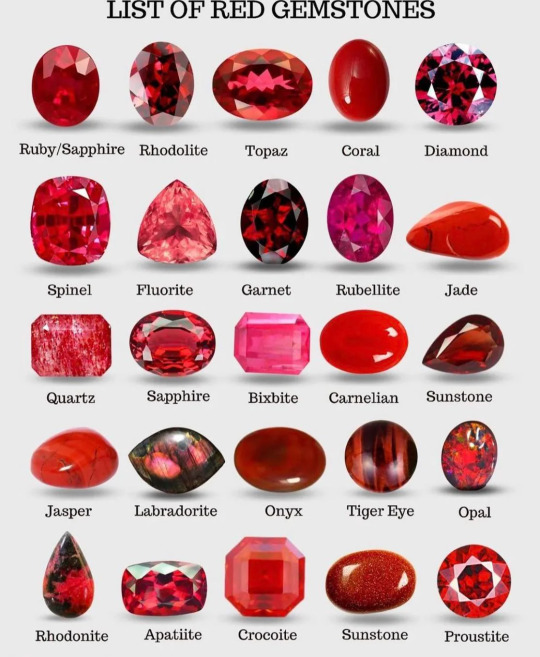
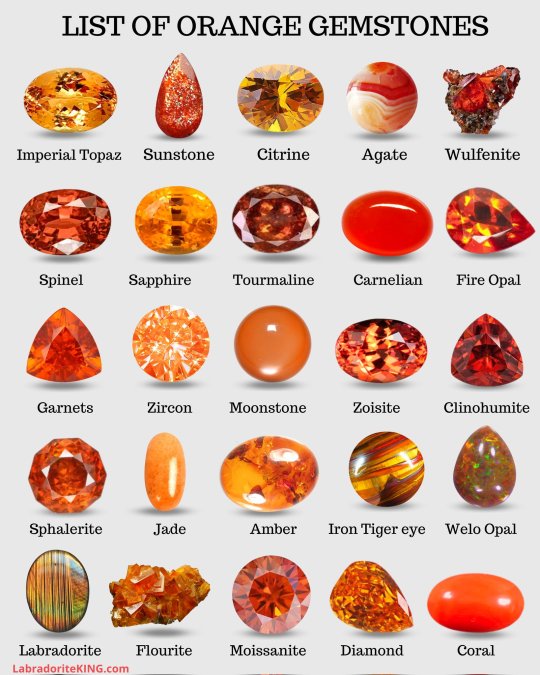
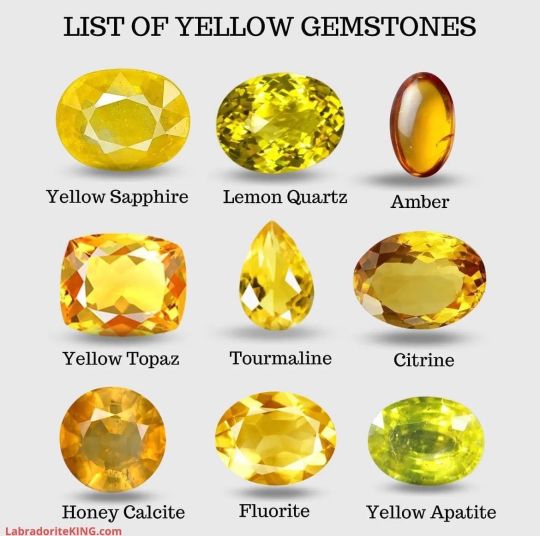
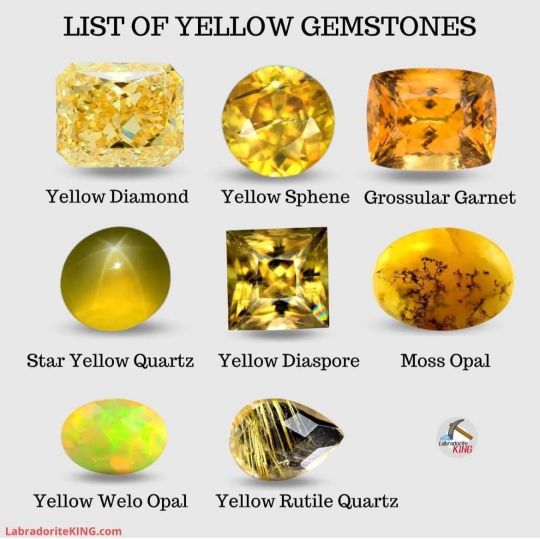
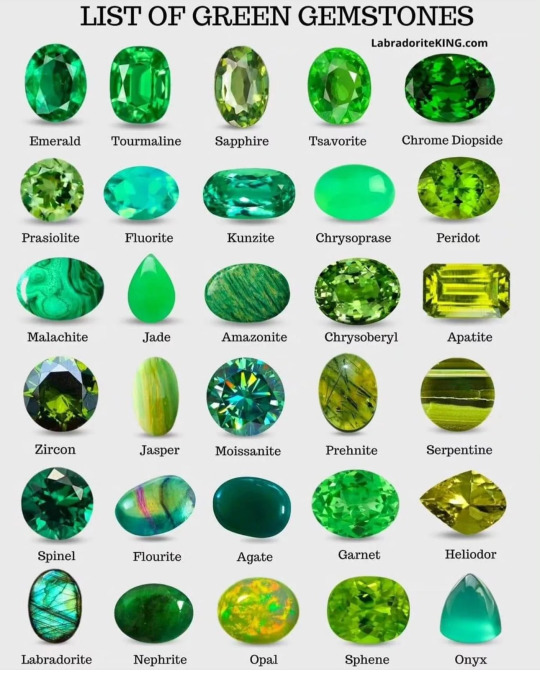
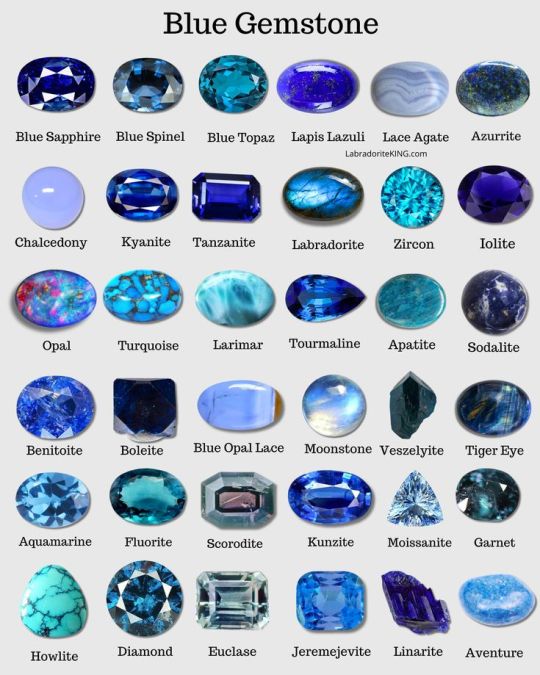
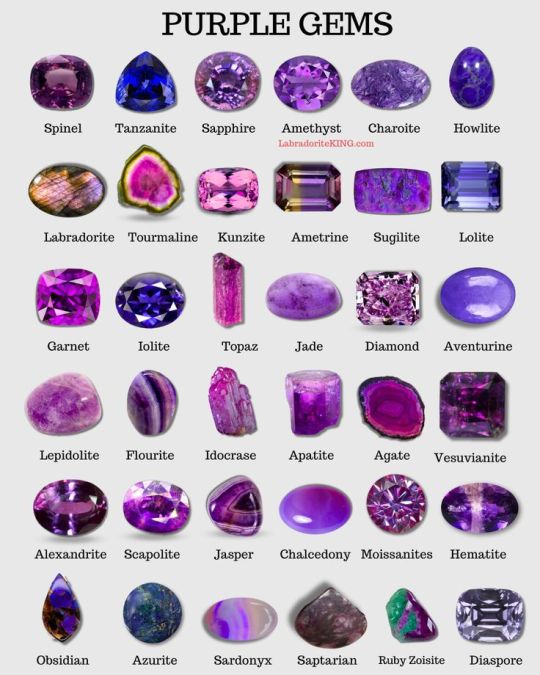
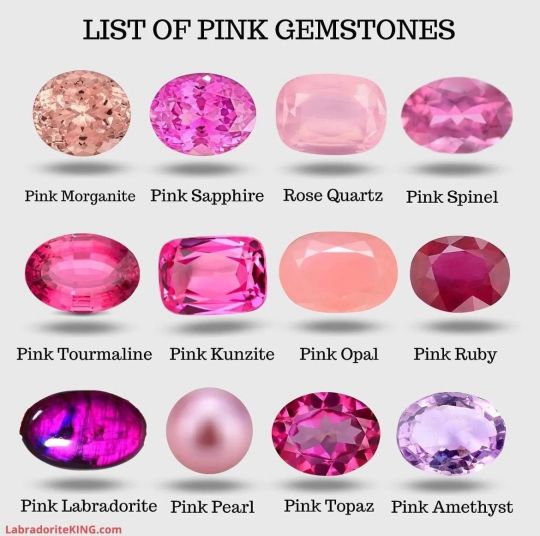
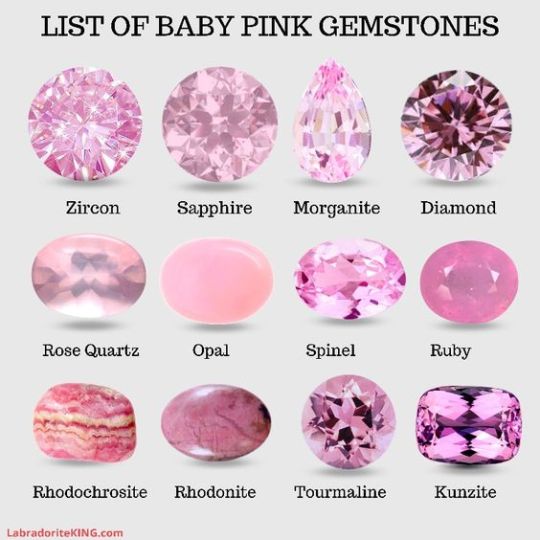
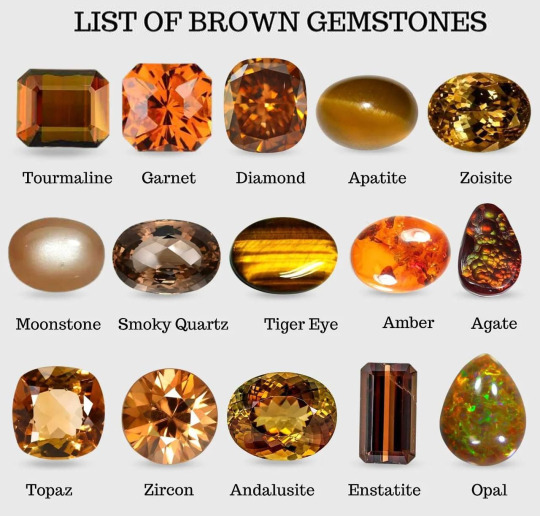
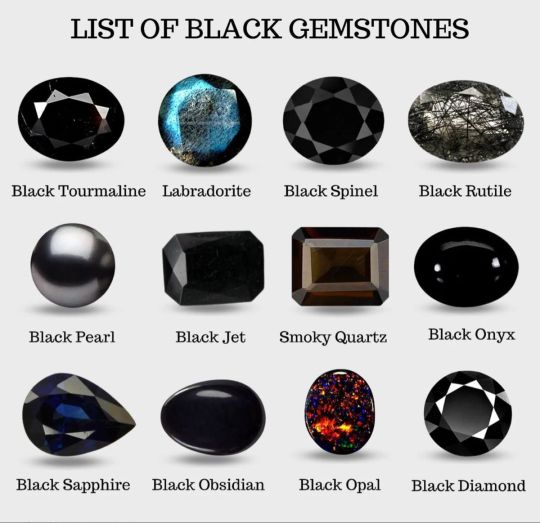

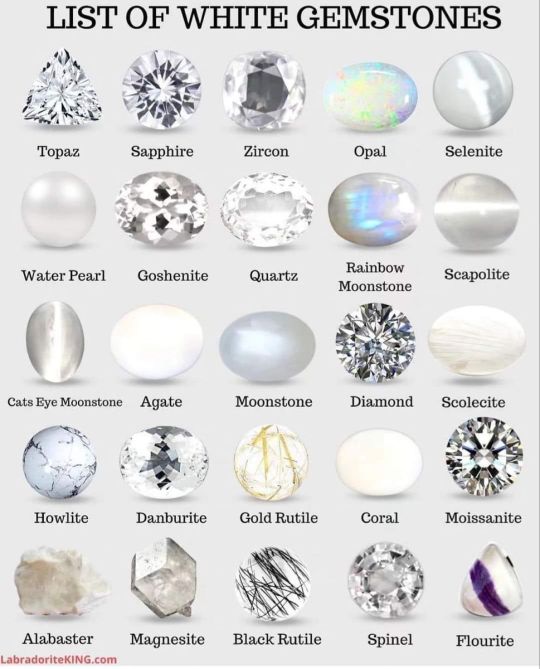
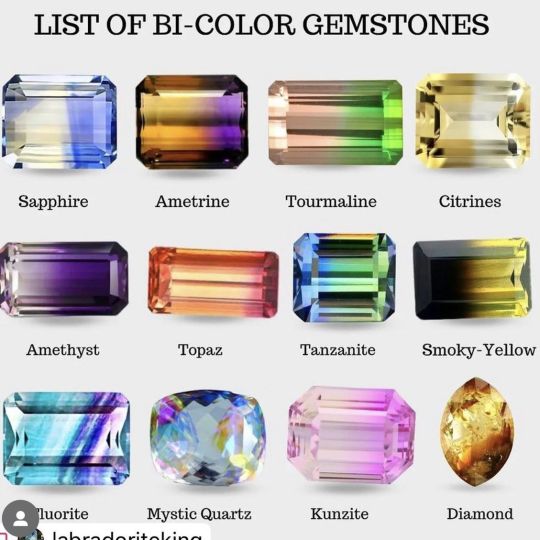
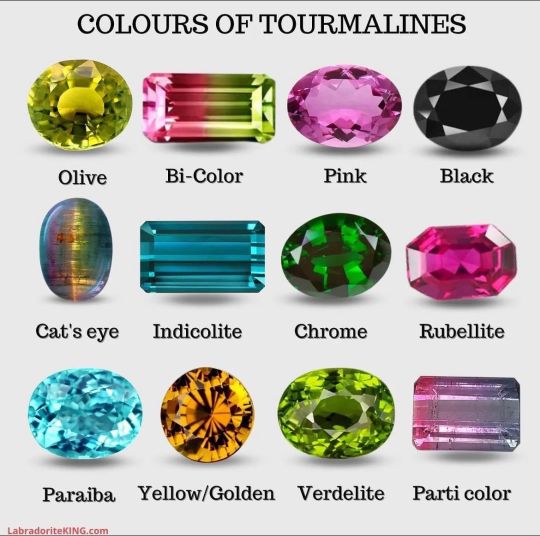
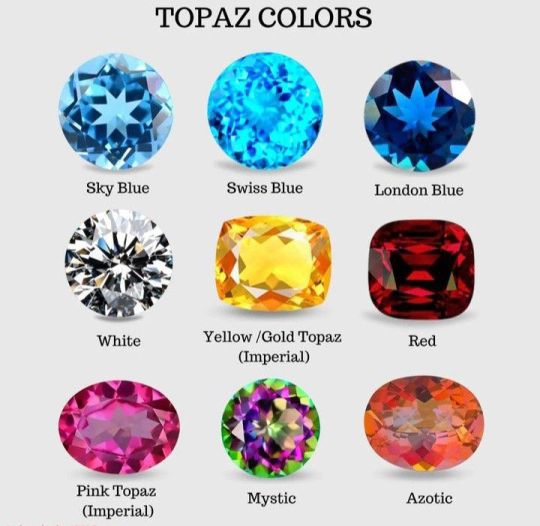
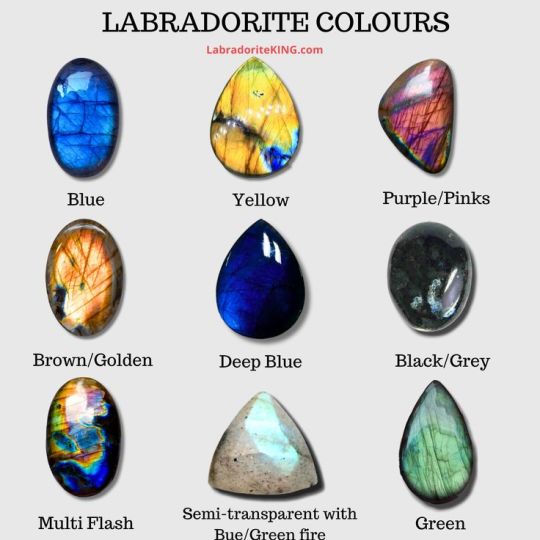
By LabradoriteKing on Pinterest
#i feel like i'm going to let you down now by confessing that i am not a lapidary#but i am a qualified gemmologist#i understand the theory of gem cutting considerations such as clevage planes - maximum yield - correct orientations for optical effects#but i don't actually cut stones so i can't answer your emerald question other than 'carefully'#i can tell you all about their stabilising treatments though?#my favourite gemstone is sapphire#because blue is my favourite colour#but my favourite gem In My Collection is moldavite#moldavite is the transparent to translucent green variety of natural glass tektites#which are formed when meteoric impacts fling superheated molten rock into the air#which cools and solidifies to glass#my moldavite has the most gorgeous intricate air bubbles#swirly twisty corkscrew shapes#i love it#i love just looking at it under 10x loupe#and as a special treat#putting it under the microscope for up to 60x magnification#geologically interesting#gemmology#infodump
131K notes
·
View notes
Text
Sparkling Success
The most precious gems in the life of Matthew Ely are undoubtedly wife Nicole, daughter Amity and the new addition which will be joining the Ely clan early next year.
Diamonds, however, run a close second.
Born into a jewellery dynasty the pride of Sydney’s west, exquisite rocks have always played a significant role in the young entrepreneur’s childhood and early upbringing with father Robert, mother Helen and brother Douglas all involved in the trade.
“My parents own and operate [York Jewellers] a well-established jewellery business in Sydney’s [Penrith], which allowed me to experience the day-to-day running of the industry and gain an insight into the world of jewellery design. My mother and father have always exemplified a strong work ethic. I was extremely inspired by my father and his passion for design as a child, and his influence definitely shaped my approach to luxury jewellery design.” Yet despite his own success, and the early enthusiasm shown by his son, the family patriarch was initially apprehensive about allowing his second born into the family business.
In 1999 when he was 12, Matthew applied for a job at York but was knocked back with his father politely, but firmly, insisting there was no spot available. He encouraged the then teenager to instead try his hand at other trades.
Matthew found work at a furniture store and later as a boilermaker but the attraction of the jewellery industry proved too strong and three years later Robert relented and offered him a job at York as a sales assistant.
He began his formal jewellery design training at Enmore TAFE and was still in his first year when he placed first in the state and second nationally in the World Skills National Championship. On the back of that he received a scholarship to London with the Australian Overseas Foundation. Moving half way around the world at such a young age was not easy but it wouldn’t take him long to begin fulfilling his passion.
After securing digs in East Putney he started knocking on doors to find work. Just weeks after passing through Heathrow immigration, he secured a job in a manufacturing workshop, Jacobs Jewellery. With it arose the opportunity to work alongside, what Matthew describes as, some of the greatest designers in the industry. “The workshop manager had worked on some of the biggest diamonds in the world – 100 carat-plus – the diamond setter was a man whom had worked on the English crown jewels, and lastly, there was a New Zealand jeweller that manufactured the £1 million necklace from [219-year-old British fine jewellery design house] Boodles. My experiences in London working alongside three of the best jewellery mentors in the world were extremely inspirational in terms of my creativity and passion for design. Their expertise and humility in sharing their knowledge helped to refine my design practices and master the skills required to craft luxury bespoke pieces.” Yet, in spite of having easy access to an assortment of precious stones, to this day Matthew only wears a single piece of jewellery – his wedding band which itself also has a unique connection to the time he spent abroad. “This is a particularly important piece for me as l designed and crafted it myself and it features personal engravings which are very close to my heart. The engraving was a wedding gift from my engraving teacher in London. He was the engraver [employed] to carve the plaques in Westminster Abbey.”
Upon his return to Australia in 2014, Matthew was afforded the opportunity to open his own boutique in Woollahra in Sydney’s leafy eastern suburbs trading under the name Matthew Ely by York Jewellery. He admits being “enthralled” by the idea of transcending from small and rustic to grand and luxe while utilising the training and skills sharpened while he was abroad.
Despite it occurring some years ago, Matthew says he can still vividly recall his first customers, a recently engaged couple who trusted him to craft their engagement ring, offering him the opportunity to not only design an exquisite piece but to personally source the gems within the ring.
In 2011, Matthew, who by then was a qualified Gemmologist, took out the Creative Jewellery Design Award at the Showcase International Design Awards. Other accolades include the ‘Fancy Colour Award’ at the Diamond Guild Australia Awards in 2013 with an Argyle pink and Blue diamond ring and the ‘Red Carpet Award’ at the Showcase International Design Awards in 2015.
He has recently been invited to join the Diamond Guild and is now the youngest ever invited member. Showcasing a selection of his hand crafted, bespoke fine jewellery along with some award-winning pieces created over the years, his eponymous boutique specialises in custom one-off pieces but also offers recrafting of beloved pieces as well as repair and cleaning services.
Its point of difference is unquestionably the boutique’s bespoke design services. “We create distinct bespoke pieces that feature immaculate design and craftsmanship and draw on my experience and knowledge of the industry. My process creating bespoke pieces for clients is an outstanding concept that allows for personalisation and something more unique than your classic jewellery piece. For brides, it represents an exciting opportunity to design a new piece that is their own, as opposed to buying a ring that is ready-made in store.”
A typical entry price point for a bespoke engagement ring is around $15,000 and he has a “small and trusted group of jewellery makers” who assist in bringing his inspiration and designs to life. Every piece is designed and crafted onsite.
The process begins by Matthew inviting interested parties into the boutique where he gets to know them personally. Once in the store, clients are able to go into detail about what they’re looking for in their dream engagement ring or statement piece via a one-on-one consultation. Once clients have decided on their desired ring style, diamond (shape, cut, colour, clarity) and precious metal for the band, he hand draws various sketches of the piece so they can visualise how the piece will look once complete.
“I try to make these as realistic a representation as possible, believing it is crucial to ensure the end product closely resembles the dream piece that the client has in mind. We have the opportunity to source so many exquisite pieces for our clients, but one experience which I recall vividly was being asked to source a one carat Pink Diamond from Argyle for a private client. This was such an exciting experience, as I had the opportunity to touch and see one of the rarest gems in the world. With regards to value, I would never divulge, but I will say it had to be delivered by armoured guard.”
An advocate for ethical sourcing, Matthew says the boutique partners with a number of suppliers to locate and source some of the most stunning and rarest gems in the world. He takes particular pride in supporting Australian suppliers and materials and has worked closely with the Argyle mine in the past, to source natural gems. “I try to be vocal in my support of ethics in both gemmology and running a business.”.
Matthew says the jewellery industry has changed dramatically since he first became involved, particularly in the engagement market, where partners now spend much more to impress and meet much higher expectations from their brides to be.
“The old three-month salary rule is no longer valid, with couples spending more to craft their perfect bespoke piece to reflect their unique love story.”
But the greatest issue impacting the sector has been the use of synthetic diamonds – a development he believes has only increased the value and demand for luxurious high quality natural diamonds.
With such an abundance of different forms of diamonds available, the popularity of naturally coloured diamonds is continually on the increase and supported by growing industry demand over the past few years, he says. “There is a definite ‘Hollywood factor’ contributing to this rise in popularity, with naturally coloured diamonds exemplifying a modernity and fashion forward approach to jewellery design. We often see clients looking for something different or unusual in terms of their jewellery, and utilising a naturally coloured diamond is an excellent way to exemplify uniqueness whilst maintaining a luxurious design. I am also seeing a sharp increase in demand for pink diamonds with the announcement of the Argyle mine closing in 2021. This supply supports 95 percent of the pink diamonds in the world.”
The demand has also been extended to pearls which have also seen a resurgence in popularity. Having become somewhat of a destination for stunning pearls, Australia is in a perfect place to capitalise on this, he says. “The globalisation of the market has allowed for gems and other precious materials to be easily sourced by all. I think it’s now more important than ever to develop a trusted relationship with your jeweller. As an expert in the field, only a jeweller can provide you the knowledge and experience necessary to ensure you are truly paying for quality. There is a multitude of information online which may give people an impression of being a diamond expert. Whilst clients should by all means be informed, it’s important that they build a strong rapport with their jeweller so they can understand what they are buying.”
Text ‘MATTHEWELY’ to +61 428 295 774 for more information
0 notes
Photo

Here I am listed via the GIA Alumni directory. Feeling proud! #feeling #proud #accomplished #accredited #qualified #gia #gemology #gemmologist #directory #diamond #diamonds #graduate #diploma #alumni #online #member #credentials #www.sarahhughes.net #sarah #hughes #sarahhughes #fine #gems #sarahhughesfinegems #gem #gemstone #stone #custom #bespoke #oneofakind
#gem#diamonds#member#oneofakind#gemmologist#feeling#accomplished#graduate#hughes#fine#sarahhughesfinegems#accredited#stone#www#bespoke#online#directory#credentials#sarahhughes#gemology#alumni#diamond#proud#gemstone#qualified#custom#sarah#gems#diploma#gia
0 notes